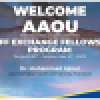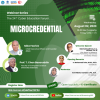- Posted by Hanna Hanifa Varda
- 18 Jun 2021
- BERITA
- Total View 0
KSF 20: Student Service Quality During Covid-19 Pandemic
Knowledge Sharing Forum (KSF) of Universitas Terbuka in 2021 has entered its 20th session. The 20th KSF which was organized virtually through Microsoft Teams platform and Youtube UT TV took up various topics “Quality Student Service During Covid-19 Outbreak”, Thursday (17/06/2021). In this opportunity, the 20th KSF presented three presenters, i.e. Torunn Gjelsvik (Secretary General of International Council for Open and Distance Education (ICDE), Prof. Tian Belawati, M.Ed., Ph.D (Universitas Terbuka), and Dr. Souma Alhaj Ali (Director Excellence and Governance of Hamdan Bin Mohammed Smart University, Dubai, UAE), as well as moderated by Dra. Suci Madiarti Isman, M.A., Ph.D.
In his speech, UT’s Rector express his appreciation to the presenters who joined in the webinar of the 20th KSF for exchanging thought and ideas well as sharing information to the public. UT’s Rector said that Covid-19 pandemic has changed all the world’s systems, including education. Covid-19 has become challenge as well as opportunity for UT in order to improve the learning facilities it has. UT’s Rector added that UT is a pioneer in the implementation of open and distance education in Indonesia. In coping with the Covid-19 pandemic, UT has performed some breakthroughs by organizing its own exams called TakeHomeExam, where the exams are done at home as the students do not have to come to the offices of Distance Learning Education Units or UPBJJ-UT, and therefore, it reduces face-to-face interaction and prevents the spread of Covid-19 virus.
The first speaker, Torunn Gjelsvik, said that as many as 330 participants and partners who belong to ICDE are distributed in 70 countries. He stated that emergency distance education should be done since face-to-face or conventional education can no longer be conducted. In dealing with Covid-19 pandemic, various institutions help each other hand in hand in the implementation of the education, including governments, UNESCO, the World Bank, NGOs, and others, particularly, in providing services and technology for free. According to him, things that are need by the students and teachers include the feeling empathy, feeling emotion has become the major role in online learning so open and distance education can be implemented with no hindrance. He has conducted some researches to students and the results show that there are three key aspects that the students are missing for, they are friends (social interaction), direct interaction with teachers, and active participation in organizations or units where the students do their activities.
The second speaker is Prof. Tian who stated that the learning system in UT, which is independent study, is not merely student self study. Therefore, the quality warranty is the core of UT’s management. The materials of UT learning are packaged in form of printed and digital materials. The students can do their lab assignments in dry lab, through both face-to-face tutorial activities and online tutorial activities which are supported by UT-TV, UT Radio, and digital library. The students are also provided with counseling services personally, through social media, or contact center.
According to Prof. Tian, there is a trend in the increase of the number of students who take online courses from 83,444 to 482,449 students. The similar increase also occurs to the use of online modes from 30% to 75% in online tutorial activities. With regard to the student services, there is also an increase of activities particularly in the contact center of Halo-UT by 848%.
The third presenter, Dr. Souma Alhaj Ali, was focusing on the roles of support services for the students. The support services in the implementation of e-learning must be designed in accordance with the pedagogy, technical, and administrative aspects which can affect the learning and teaching process. The students are also required to obtained the support services which allow them to interact personally or directly with the tutors, mentors, counselors, librarians, technical staff, and advisory teams. If all the above are met, the expectation of the students in gaining the knowledge can be well managed. Souma added that university must own sufficient support staff member. It must be ensured that the staff members must have the qualification as well as clear job descriptions and they are supplied with the access to the required information and provided with training and personal development programs for the support staff members. The distribution of works must be well managed.






